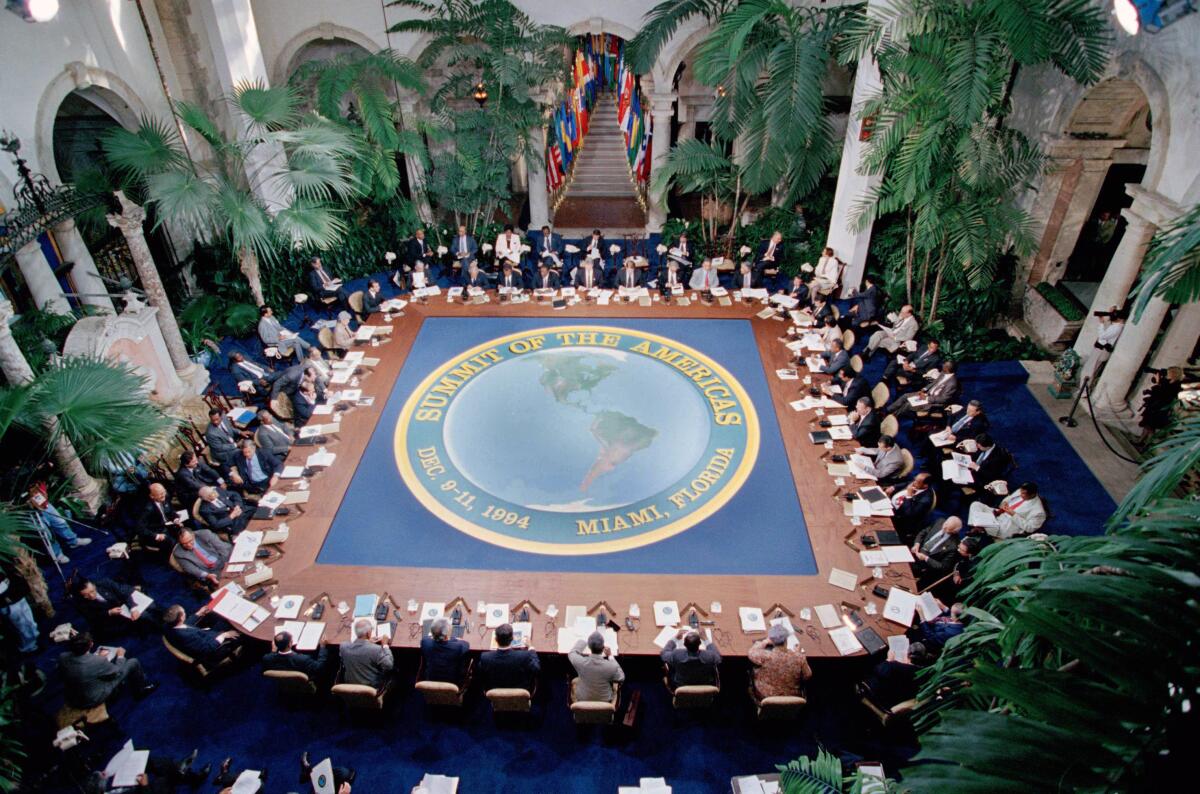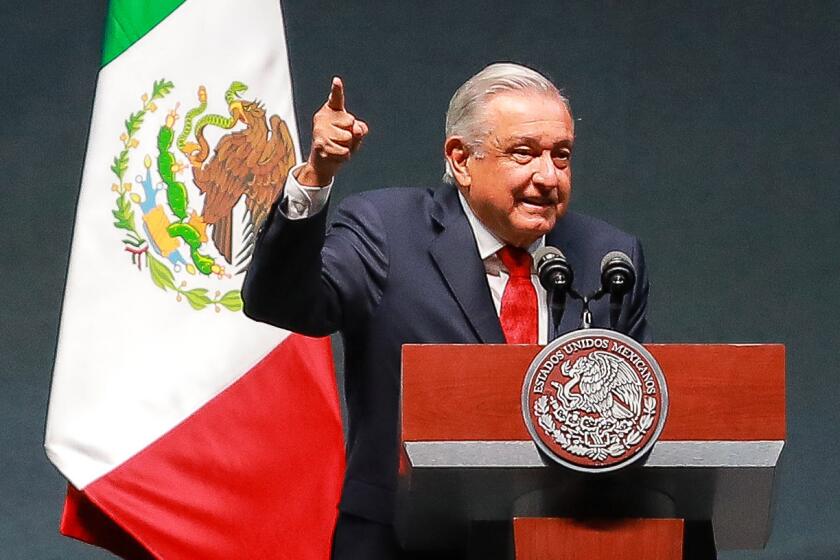Op-Ed: Why we don’t need a Summit of the Americas ever again

Leaders from the Western Hemisphere are gathering in Los Angeles for next week’s ninth Summit of the Americas, ostensibly to ensure more effective engagement between the United States and its neighbors. As he prepares for the triennial conference President Biden should do something seemingly counterintuitive — make it the last such summit.
Originally envisioned as a vehicle to advance U.S. interests in the Americas, the Summit of the Americas is a fatally flawed forum that doesn’t serve its purpose and limits our country’s focused attention on its closest neighbors to a once-every-three-years event.
Since its inception, the meeting has failed to deliver. Its most notable milestones are either doomed initiatives such as the Free Trade Area of the Americas in 1994, or misremembered breakthroughs such as the “first’’ handshake between President Obama and Cuba’s Raul Castro at the 2015 Summit in Panama (they first shook hands in South Africa in 2013 and announced the normalization of relations between the U.S. and Cuba in December 2014).
President Andrés Manuel López Obrador not only hasn’t stemmed violence in Mexico, he has undermined transparency and the rule of law.
The underlying reason for this track record of failure has nothing to do with the U.S. relationship with the rest of the countries in the Western Hemisphere. Two other notable forums that lump Latin America and the Caribbean into one undifferentiated region, but exclude the United States, also consistently fail to advance the interests of the hundreds of millions who live there.
The Community of Latin American and Caribbean States, which gathers all countries in the Western Hemisphere except the United States and Canada, seems to regularly achieve only two things — denouncing U.S. policy toward Cuba and asserting that the Falkland Islands should be ceded to Argentina. Possibly the most memorable moment out of the 27 Ibero-American Summits that gather together the leaders of Spain, Portugal and the countries of Latin America was Spain’s then-King Juan Carlos uttering the phrase “¿Por qué no te callas?” to tell Venezuelan President Hugo Chavez to shut up in 2007.
None of this should come as a surprise if we examine the vast diversity represented among the 34 countries in the Western Hemisphere. From a U.S. perspective, there is next to nothing outside of geography that links our relationship with Belize and Brazil; Guatemala and Grenada; Colombia and St. Kitts and Nevis.
As eight previous occasions have shown, trying to find consensus-driven common ground among these disparate states inevitably leads to pablum with no real-world effects.
As a result, the meetings become personality pageants. President Clinton’s star power in 1994 still provides the first summit with an air of accomplishment. In 2005, a protest featuring soccer star Diego Maradona stole the show in Argentina. Before it became about a U.S. Secret Service scandal, the 2012 summit was about whether Hugo Chavez was healthy enough to attend (he wasn’t). In 2018, news centered on President Trump’s skipping the event. This year we have the telenovela over whether Mexican President Andres Manuel López Obrador will attend.
The Summit of the Americas in Los Angeles next week will highlight migration, COVID-19 and climate change. But its guest list remains a mystery.
None of this benefits the people of the Americas, nor does it advance U.S. interests, particularly when countries are wrestling with profound challenges, including the ongoing COVID-19 pandemic, the climate crisis and preserving democracy from threats posed by nativists and populists. To the extent that Biden and his team move the needle on these and other critical issues at next week’s Los Angeles summit, they will do so with ad hoc groups of countries in attendance rather than all 34.
There is a better way forward that would provide annual action-forcing events within the U.S. government to ensure sustained attention on key issues in the Americas. Instead of promising to continue participating in a Summit of the Americas every three years, Biden should propose separate regional meetings with the leaders of the countries of Central America, the Caribbean and South America, on a rotating annual basis.
Such meetings would allow focused discussions with leaders of subregions where the U.S. interests are more coherent and better define each subregion’s relationship with the United States. Two hemisphere-related summits every year — the annual North American Leaders’ Summit and a subregional summit — would afford the Western Hemisphere the level of sustained high-level attention that U.S. interests in the region merit.
The countries of Latin America and the Caribbean, of course, could continue meeting as a group as many times as they’d like, but those meetings wouldn’t drain time and attention at the highest levels of the U.S. government that could be better spent on substantive engagement with our neighbors.
To advance U.S. interests in the Americas, the time has come to lay the Summit of the Americas to rest.
Dan Restrepo served as special assistant to President Obama for Western Hemisphere affairs and coordinated his participation in two Summits of the Americas.
More to Read
A cure for the common opinion
Get thought-provoking perspectives with our weekly newsletter.
You may occasionally receive promotional content from the Los Angeles Times.












